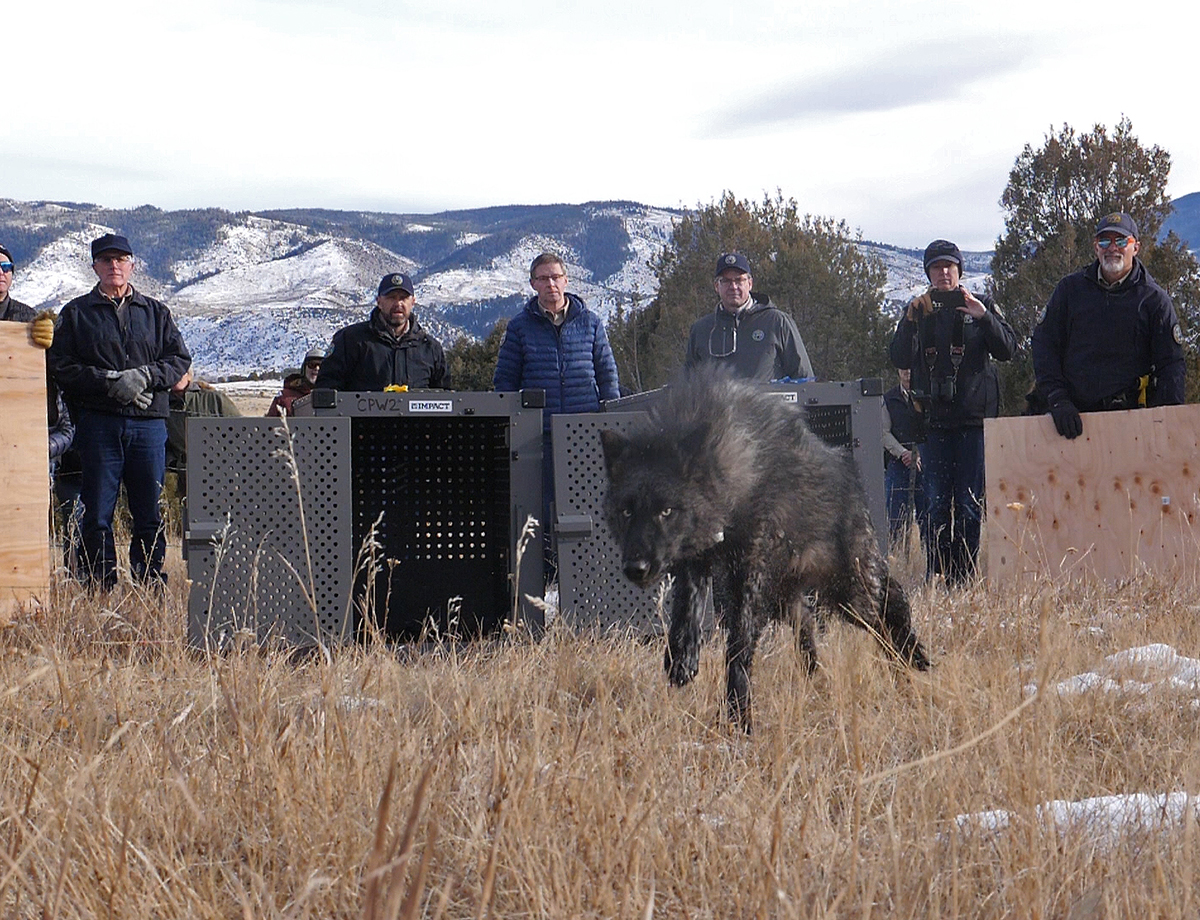CPW Commission Adopts Staff Recommendation Denying Citizen Petition to Delay Gray Wolf Restoration

Description: The Colorado Parks and Wildlife Released the Following Statement Regarding the Reintroduction of Gray Wolves in Colorado on January 8, 2024... Photo Description: Colorado Parks and Wildlife veterinarian Pauline Nol and biologist Ellen Brandell examine 2307-OR on December 17, 2023. (Courtesy Photo)
Colorado Parks and Wildlife Commission Adopts Staff Recommendation Regarding Citizen Petition to Delay Gray Wolf Restoration
DENVER – At its meeting today, the Colorado Parks and Wildlife Commission voted 10 - 1 to adopt the staff’s written recommendation to deny a citizen petition requesting rulemaking to delay gray wolf restoration efforts.
The Commission determined rulemaking was unnecessary because the seven conditions listed in the petition had been addressed by CPW and were discussed at length during today’s meeting in Denver.
Topics that have been addressed and were discussed today included:
- Development of a state range rider program
- CPW is partnering with the Colorado Department of Agriculture (CDA) to create the Colorado Range Rider program that will launch in early 2025. CDA and CPW staff members, as well as any future contract range riders, will go through specialized training to create a team of trained range riders with connections to local communities who can be deployed to support producers at short notice.
- Development of a depredation response operations team to address conflicts
- CPW has developed criteria for different levels of response as a guide for field staff to use when addressing wolf conflict and depredations, either proactively or reactively. The levels help assist in determining how much staff time and resources could be used for a depredation or from known wolf activity and risk for possible future conflict.
- Non-lethal conflict techniques
- CPW and partners are able to provide multiple, proven non-lethal tools and resources to livestock producers in order to minimize wolf-livestock conflict. The first step is to establish a conflict mitigation plan through a site assessment where the most appropriate tools and methods will be identified. Potential funding sources and support will also be reviewed. CPW and its partners also continue to investigate new and innovative non-lethal techniques.
- Site assessment program
- Site assessments are a critical tool for identifying the most appropriate and effective non-lethal tools and techniques specific to each individual operation. Site assessments are free and are conducted by staff from CPW, CDA, USDA-APHIS Wildlife Services, and USDA NRCS, in collaboration with the livestock producer. CPW has recently updated and formalized the site assessment process for 2025. CPW strongly encourages producers to enroll in voluntary site assessments by calling their Area CPW Office or local CPW officer.
- A definition of chronic depredation
- Colorado Parks and Wildlife has created an internal administrative directive defining “chronic depredation” and lethal removal considerations for gray wolf management.
- Collaboration with ranchers on carcass removal
- CDA and CPW have worked with neighboring states to understand best practices for carcass management in wolf country. A list of best practice recommendations compiled from lessons learned in other states can be found here.
- Development of a communication plan and consultation with local officials, communities and producers
- CDA, CPW, USDA-APHIS Wildlife Services and CSU Extension will continue to host educational workshops across the Western Slope. A full list of past and upcoming workshops can be found on CDA’s website where producers can also find the link to register for the educational workshops.
- CPW continues to hold meetings with local communities and elected officials for open discussions about potential release locations and how to prepare to live with wolves. CPW will continue to update the public on restoration activities throughout this capture and release season.
The reference materials on the definition of chronic depredation and associated lethal management considerations, as well as a copy of the citizen petition and the meeting agenda are available in the meeting materials for the January 8-9 meeting on the commission webpage.
CPW also published a Wolf-Livestock Conflict Minimization Program Guide. This guide provides information on a variety of tools and methods available for livestock producers to employ in efforts to reduce the likelihood of wolf-livestock conflicts and establishes a framework for CPW’s response, along with available support from other state, federal and nongovernmental organizations.
“This decision affirms everything our agency and its partners have already been focused on regarding the conditions in the petition,” said CPW Director Jeff Davis. “We’ve been listening to and working with all stakeholders in this historic restoration effort. The results are evident in our improved Conflict Minimization Program, the addition of new staff to work alongside producers, strengthened partnerships, and guidelines for producers as it relates to chronic depredation and lethal management considerations. We remain committed to working with all impacted parties as we continue to implement the law as passed by the voters.”
CPW has been focused on creating a significantly expanded management program throughout the first year of voter-approved wolf restoration in Colorado. The efforts support the implementation of the Colorado Wolf Restoration and Management Plan as the agency prepares for the second capture and release season.
The continued releases of wolves in Colorado will supplement the first round of releases completed last season. Adding animals to the existing population will increase the likelihood of pairing, breeding and pack formation.
This will create more consistent territories that allow CPW to monitor patterns within a territory and will improve the agency’s ability to collaborate with ranchers on active behavior and coexistence strategies to best protect livestock.
Related Content:
Colorado Parks and Wildlife Begins Operation to Capture Wolves from the Copper Creek Wolf Pack
Colorado Parks and Wildlife Releases Gray Wolves on Colorado’s Western Slope
.png)

.jpg)



